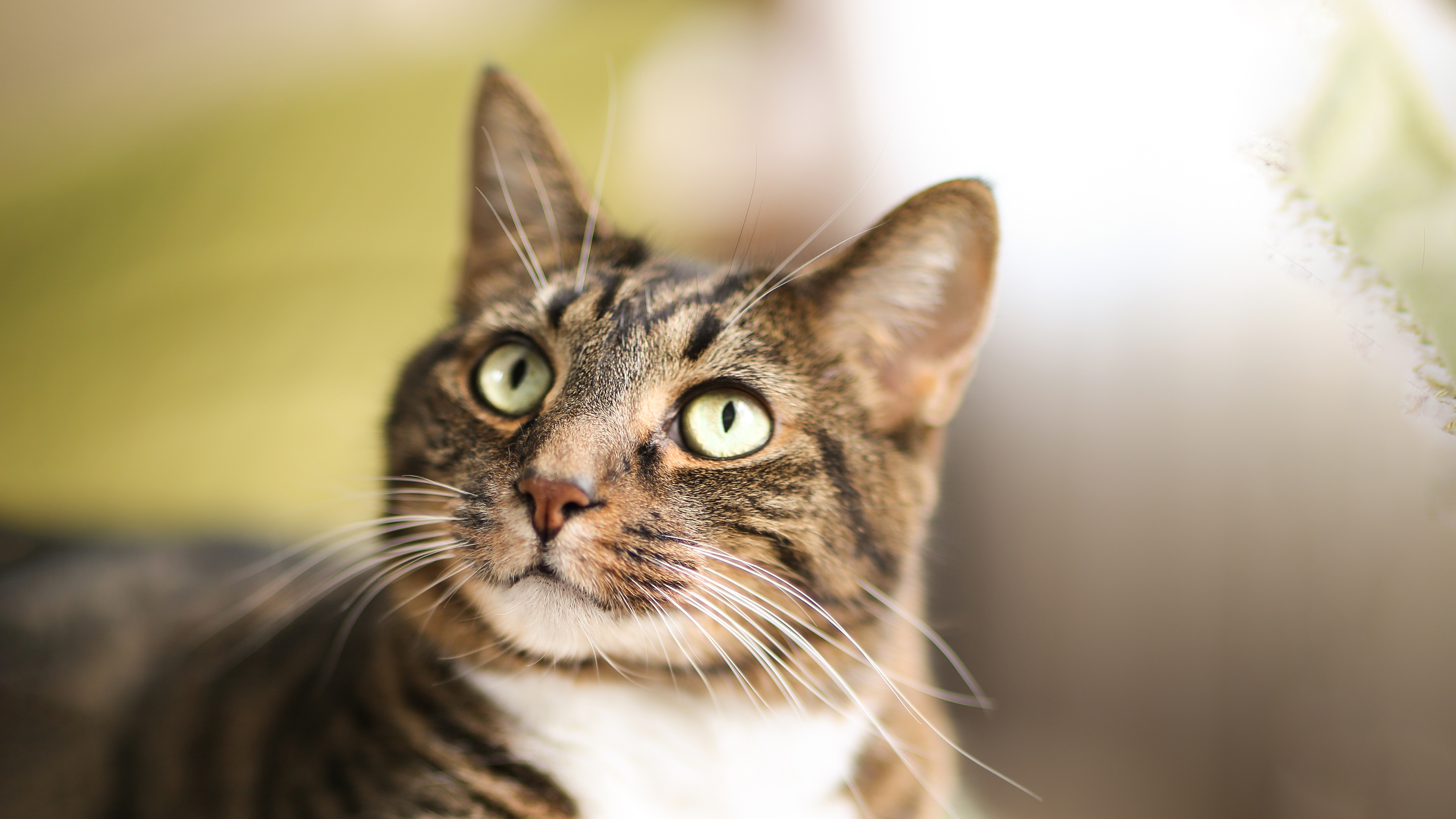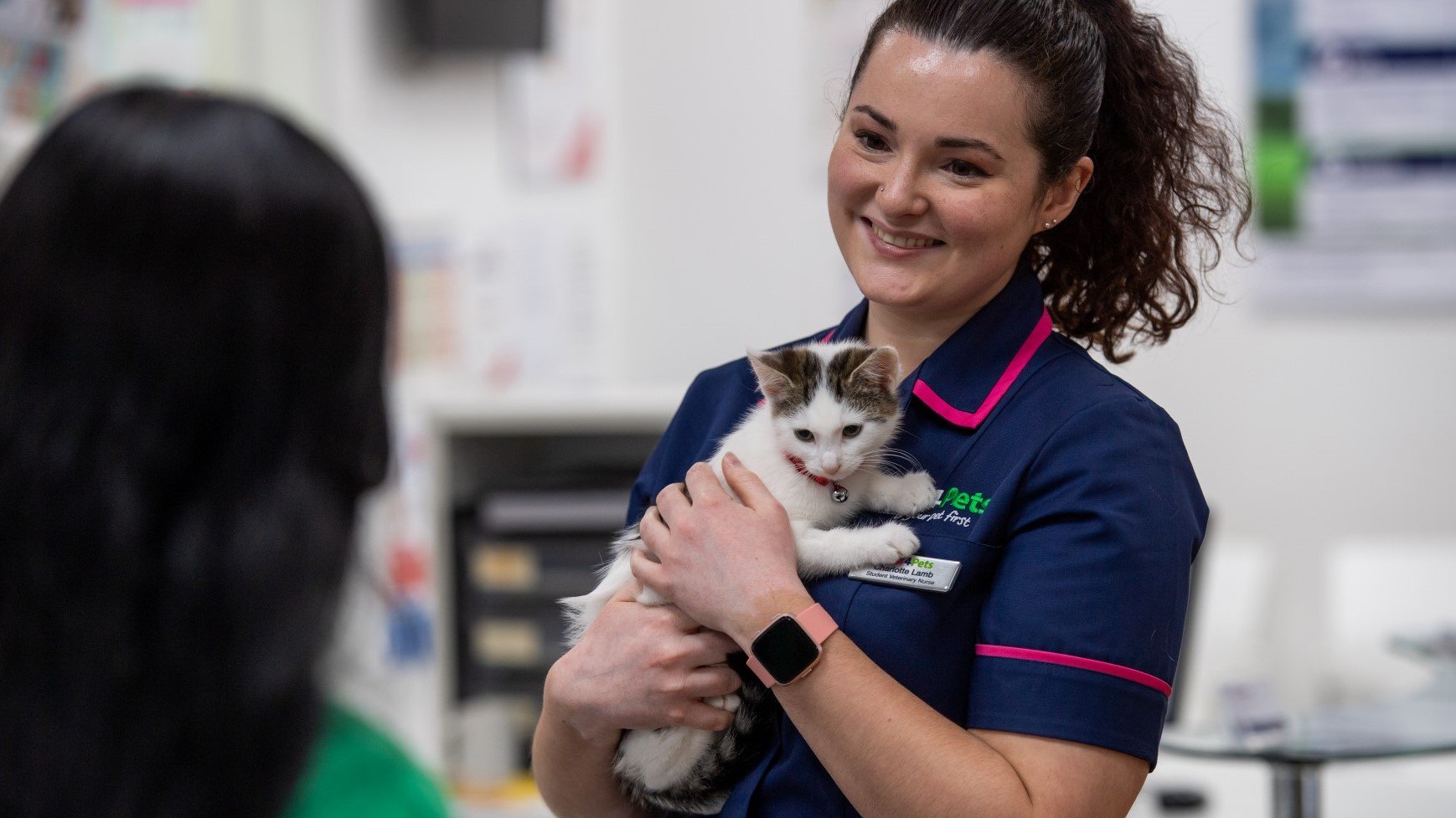
Cat & Kitten Vaccinations
A vaccination appointment is a chance for your cat to get a thorough physical health check, as well as offering them protection against a range of diseases.
A routine procedure, a vaccination appointment is more than just a jab – it’s a chance for your cat to get a thorough physical health check, as well as offering them protection against a range of diseases that can be debilitating, or even kill.
Vaccination appointments are performed by a vet, and should be a routine part of the care of all cats throughout their life – even house cats. Although house cats may be less exposed to disease, many of the diseases we can vaccinate against are hardy, and can survive outside of a cat for some time. This means they can be transmitted inside the house, on people or objects, and are still a risk to cats via indirect exposure.
Kittens are old enough to be vaccinated once they are 8-9 weeks old, and keeping your annual vaccination appointment every year is really important for both you, and your cat. If you would like to learn more about vaccinating your cat, contact your local Vets4Pets practice here.
Health Plans to keep your cat healthy
At Vets4Pets we offer a range of Health Plans that make essential routine treatments more affordable. You'll save money on things like annual vaccinations, flea and worm treatment and routine health check-ups.

More about vaccinating your cat
Kittens are old enough to be vaccinated once they are 8-9 weeks old. They will have an initial injection, and then a second about 3 weeks later, as well as a thorough health check, and discussion about all aspects of kitten-care, including neutering, flea and worm protection, diet and behaviour. This is known as the ‘primary course’. Kittens should then have an annual vaccination appointment each year, throughout their lives, in order keep their immunity topped up and maintain protection.
For adult cats, if you are not sure if your cat has had vaccinations previously, or if you know that they have not had a vaccination appointment within the last 12 months, your cat may need to restart their vaccinations with a primary course, just as if they were a kitten. Adult cats can start the primary course at any time, but if you know your cat is currently not protected by vaccination, the course should be started as soon as possible.
Although your cat will need a vaccination appointment every year, not all the vaccines will be given at every appointment. This is because different vaccines last for different amounts of time, and the need for some vaccinations may be lifestyle dependent. Your vet will be able to advise on the best schedule for your cat.
A vaccination appointment is much more than a quick injection for your cat – it is you and your vet’s chance to really see how your cat or kitten has been doing. Your cat will be weighed, and have a thorough medical exam. Your vet will probably ask you lots of questions about how your pet has been behaving, about any changes, and about specific topics such as their eating and drinking habits. Your vet is trained to spot subtle changes, helping any developing issues be managed as soon as possible. Your vet will also listen to any concerns you may have, and help you manage these.
The medical exam also allows the vet to check if there are any visible reasons to delay vaccination, for example if your cat is already fighting an active infection.
As well as the thorough exam, your vet will administer the vaccinations. The exact vaccine will differ year on year depending on the vaccine schedule, but all cats require vaccination against at least one disease annually. Vaccines are combined into a single injection, so your cat only has to have one needle. This is given under the skin at the back of the neck, and is well tolerated by the vast majority of cats.
Chlamydophila vaccination is not a part of the standard vaccination protocol, but can be offered in high risk situations. Chlamydophila is a bacteria, and infection is usually seen as a conjunctivitis (inflammation of the delicate tissues around the eye). Infection is passed directly from cat-to-cat – this virus is very fragile and cannot survive in the environment. Chlamydophila infection can persist for several weeks and be unpleasant, but infection can be treated with antibiotics. Vaccination is usually only given to high-risk cats in group situations, and while providing protection against severe clinical disease, does not fully eliminate the risk of infection.
Feline Herpesvirus (FHV) and Feline Calici virus (FCV): Both feline herpesvirus and feline calici virus are contagious and are usually transmitted by direct or close contact between cats, such as in sneeze droplets or discharge from the eyes; they may also survive for periods in the environment and so could be transmitted via shared food bowls and litter trays, bedding or grooming aids.
Cat flu signs include sneezing, nasal and eye discharge, conjunctivitis, and mouth ulcers. Clinical signs vary from mild to extremely severe, and occasionally other complications may develop such as pneumonia. Feline herpesvirus is much like cold sores in people; even after the initial signs subside, most cats will remain permanently infected and some will develop flare ups later on especially when their immune system is low.
- Treatment for cat flu is based around supportive care – antibiotics do not work against viruses, so the disease must run its course. Cats may however receive antibiotics as part of their supportive care during an attack of cat flu, if appropriate, as this will help prevent or treat secondary bacteria. Affected cats may require other supportive treatment as well such as anti-inflammatories, a drip, steam inhalation and nutritional support, depending on the severity of the infection.
In addition to cat flu, FHV can cause skin and eye problems (keratitis) and FCV can cause painful joints and chronic gingivitis and stomatitis (inflammation of the inside of the mouth). For these signs other treatments might be recommended such as antiviral medication or pain relief.
Both of these viruses are extremely common in our cat population and the disease can be severe which is why vaccination is considered important for all cats. Although vaccination does not always prevent infection with these viruses, it will help greatly in reducing the severity of disease.
Feline Parvovirus, Panleukopenia virus: This is a highly contagious disease, which can be spread through bodily fluids, faeces and fleas as well as contaminated items such as food bowls, bedding, floors and contact by hands. Unfortunately this virus is able to survive for up to several years in the environment, and is resistant to many disinfectants. It is therefore the biggest disease threat to any rescue facility, and infection carries a very high mortality rate, particularly in unvaccinated kittens.
Cats suffering from feline infectious enteritis will experience sudden vomiting and diarrhoea, which is often bloody. Pregnant cats with the virus can pass it onto their unborn kittens which can affect their brain development and cause mobility problems once born.
Unfortunately, there is no specific treatment, and despite supportive treatments cats will often suffer from severe dehydration and massive secondary infections which result in a poor outcome. Highly effective vaccines are available, however, and all cats and kittens should be vaccinated as this virus is much better prevented than treated.
Thankfully rabies is not present in the UK, but if you want to take your cat abroad and bring them back into the country, or if you want to adopt a cat from overseas, they will need to be vaccinated against rabies. There are several other requirements for overseas travel, which differ depending on where you are travelling to. Speaking to your vet before you travel and getting all your documentation in place is critical for a smooth and stress-free journey for you and your pet.
This virus attacks the immune system and leaves cats more susceptible to infection and illness, as well as being prone to developing certain cancers. The disease can be transmitted from other infected cats by mutual grooming, sharing food and water, bites from infected cats or may be passed on from a queen to her kittens.
During early stages of the disease, cats may not show any signs of illness but as the disease progresses you may notice weight loss, lethargy and other poor health including pale gums, poor coat, fever, diarrhoea and recurrent respiratory tract infections. Infected cats will progressively deteriorate over time.
Sadly there is no specific treatment for this virus. Secondary infections are common due to the destructive nature of the disease on the immune system so treatment will be focused on relieving the cat from pain and discomfort, but their survival rate is much shorter compared to uninfected cats. Any cat that tests positive for FeLV should be isolated from other cats and kept indoors to prevent transmission.
As this disease is only passed via bodily fluids, indoor cats may not require a vaccination against feline leukaemia. Your vet will discuss the risk to your cat with you, but you may choose to give your cat full cover anyway, to protect them if they do accidentally get outside, or if they are exposed to other cats in environments such as a cattery.
Cat Advice
Read more of our expert cat advice to keep your cat happy and healthy.
